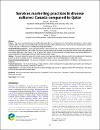Participation Behaviour Among International Students: The Role of Satisfaction with Service Augmentation and Brand Choice Attainment
| Author | Elsharnouby, Tamer H. |
| Available date | 2023-05-09T09:20:12Z |
| Publication Date | 2016 |
| Publication Name | Developments in Marketing Science: Proceedings of the Academy of Marketing Science |
| Resource | Scopus |
| Abstract | Interest in understanding and managing the student experience has been growing in order to develop and offer high-quality, satisfaction-creating service experiences (Bowden and D’Alessandro 2011; Fagerstrøm and Ghinea 2013). This interest appears to be driven by a range of changes in the higher education sector. Students are becoming more demanding and active information seekers and prefer informal and personal forms of information to formal information (Fagerstrøm and Ghinea 2013). With technology-literate and highly diverse students, universities are increasingly facing pressure to manage students’ expectations and offer a high-quality learning experience. This pressure is coupled with the introduction of higher tuition fees and constraints on public funding in some countries, such as the UK. These changes reinforce the perspective in which students are viewed not only as customers who seek personalized services and high-quality outcomes, but also as active players in shaping the university experience. Therefore, the challenge remains for universities to determine how to respond to these changes and engage students as active co-producers of the university experience (Bowden and D’Alessandro 2011). In view of this orientation, this study examines the role of students’ satisfaction with university augmentation services (financial, maintenance, campus life, and health augmenters) in generating their overall satisfaction with the university and explores the influence of brand choice attainment and satisfaction on student participation behaviour. Drawing on an empirical survey of 238 international students in UK universities, the model was tested using structural equation modeling. The findings reveal that not all service augmenters are equally important in creating satisfaction. Campus life and maintenance augmenters are found to be the crucial elements in generating satisfaction for current international students. The results also suggest that satisfied students are more likely to participate actively in co-producing the university services compared to dissatisfied students. The effect of brand choice attainment on participation behaviour is mediated by satisfaction. This implies that it is not sufficient for a university to be students’ first choice of brand to get them to participate actively in co-producing the services. Whether they enrol in their preferred university or an alternate university, students should be satisfied to participate actively in co-producing non-academic services. University administrations should prioritize their efforts to put more emphasis on some elements especially crucial for international students and could embellish or deplete the core of education services. There is also a pressing need for universities to segment their international students based on the brand choice and give more emphasis to those students not accepted by their preferred university. A superior university experience should be created, particularly for ensuring this type of students can overcome the disappointment of not enrolling in the preferred university.References available upon request. |
| Language | en |
| Publisher | Springer Nature |
| Subject | Academy of Marketing Science World Marketing Congress Global Marketing Consumer Behavior Marketing Strategy Marketing Theory Digital and Social Media Marketing Retailing Product and Branding Strategies Sales Management |
| Type | Book chapter |
| Pagination | 859-860 |
Files in this item
| Files | Size | Format | View |
|---|---|---|---|
|
There are no files associated with this item. |
|||
This item appears in the following Collection(s)
-
Management & Marketing [664 items ]


